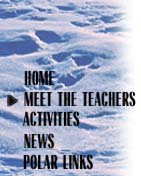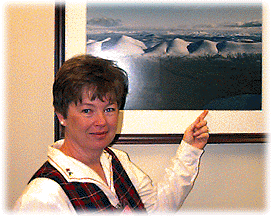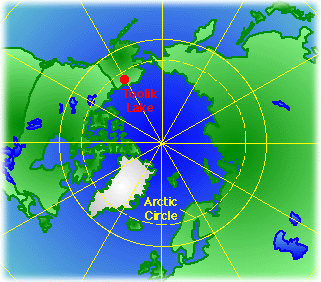
|
|






Hello, my name is Terry Lashley. I am very excited to be a part of the National Science Foundation/Office of Polar Programs' Teachers Experiencing the Arctic and Antarctic (TEA) program. My education and experience are in secondary science education with a concentration in the biological sciences. I have an undergraduate degree from the University of Wisconsin, Superior, a masters degree from the University of Tennessee, Knoxville (UTK) and am currently a Ph.D. candidate at UTK with a focus on science education policy. After teaching advanced placement and college preparatory biology in high school, gifted science and earth science in middle school, and general biology in a drop-out recovery program (approximately 20 years) I left the classroom and began working as a program administrator at the Oak Ridge National Laboratory's Office of University and Science Education. In this capacity I was able to work with secondary students and teachers in research assignments and programs and, also, with elementary teachers through National Standards-based, hands-on science and mathematics professional development programs and workshops.
The project I will work on involves the study of an Arctic River (the Kuparuk) ecosystem. When I return from the Arctic, I will report to a new position with the University of Tennessee, Knoxville (UTK)/Appalachian Rural Systemic Initiative (ARSI) Resource Collaborative. The ARSI, a six-state NSF-funded project, is designed to improve and enrich the quality of science and mathematics instruction in selected counties of the service region. As Director of the UTK/ARSI Resource Collaborative, I will be working with schools and school systems in Virginia, North Carolina, Kentucky, and Tennessee using technology as a "vehicle" to remove some of the barriers of geographic isolation as well as improve access and communication with these targeted systems. Technology and telecommunications will also be used as a means for the delivery of some curriculum material.

Key Connections in Arctic Aquatic Landscapes
Investigator: John E Hobbie,
Woods Hole Marine Biological Lab
My project was part of a large program studying connections among various components of aquatic ecosystems. My work involved examining insect populations and bird activity along the Kuparuk River in Alaska. We want to understand the interactions of birds and insects and their environments so that we can predict how their interactions may change with time and environmental stress. To catch insects, I made "sticky" cards to place in the Kuparuk River area. Later I counted the trapped insects and used population statistics to compare numbers of insects in the study area with those of other regions. I also did some bird watching, counting, and identification, with a parcticular interest in the birds eating insects along the river corridor!
The larger project looks at linkages connecting watersheds, rivers, streams, and lakes. Alaska is a good place to carry out this research because it contains areas that are remote and still pristine. Our area was chosen not only for its undisturbed nature but also for its relatively simple food web. A less complex system makes experimental results easier to understand. Also, because this is an extreme environment, organisms here have special adaptations that help us design experiments and see their results.
Results from this research program will be incorporated into models of how the "real world" functions. As researchers build their models they will identify gaps in their understanding of the natural system, and how best to fill those gaps. After the models are refined, they will be used to predict how changes in the environment will affect the ecosystems, and to identify what sorts of changes the systems are most sensitive to. With this knowledge, we will know where best to look for early warning signs of environmental perturbations, whether it is caused naturally or by human influence on the landscape.

Toolik Lake field site.

August 1997
| Su |
Mo |
Tu |
We |
Th |
Fr |
Sa |
| -- |
-- |
-- |
-- |
-- |
1 |
2 |
| 3 |
4 |
5 |
6 |
7 |
8 |
9 |
| 10 |
11 |
12 |
13 |
14 |
15 |
16 |
| 17 |
18 |
19 |
20 |
21 |
22 |
23 |
| 24 |
25 |
26 |
27 |
28 |
29 |
30 |
| 31 |
-- |
-- |
-- |
-- |
-- |
-- |
July 1997
| Su |
Mo |
Tu |
We |
Th |
Fr |
Sa |
| -- |
-- |
1 |
2 |
3 |
4 |
5 |
| 6 |
7 |
8 |
9 |
10 |
11 |
12 |
| 13 |
14 |
15 |
16 |
17 |
18 |
19 |
| 20 |
21 |
22 |
23 |
24 |
25 |
26 |
| 27 |
28 |
29 |
30 |
31 |
-- |
-- |
Return to top of page
|







